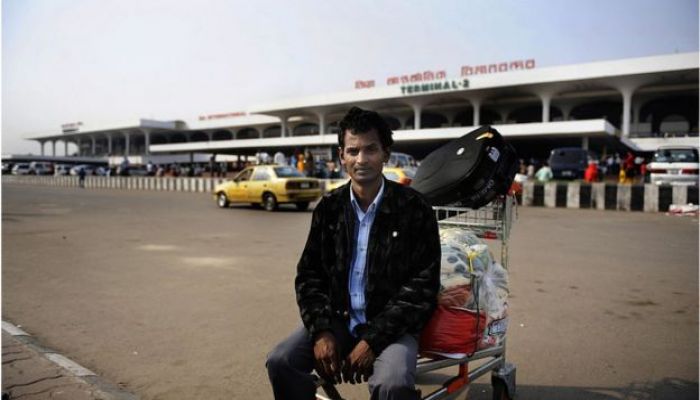
*Sanjana Chowdhury
Publish: 06 Jul 2020, 06:00 pm
The Plight of Forced-to-Return Home Migrant Workers

Due to the coronavirus epidemic, most of the countries have adopted cost-cutting policies and a large number of migrant workers have already lost their jobs and been forced to return home.
On the other hand, there is uncertainty about whether they will be able to go abroad and get a job again as Bangladesh Placed lockdown across the country because of the corona spread.
Now, experts have advised the government to address the problem both domestically and internationally to prevent the return of these migrant workers.

The data from BRAC's immigration program shows that about 200,000 migrant workers returned to the country between February and March last year.
On top of that, at least 18,000 more workers have returned to the country on chartered flights since the international route was suspended on March 21.
Recently, the embassies of Bangladesh from Saudi Arabia, Qatar, Kuwait, and other countries informed the Ministry of Foreign Affairs that a large number of workers may lose their jobs.
So it is feared that the flow of migrants will increase in the coming days.
Uncertainty after being forced to return to the country
The outbreak was preceded by coronavirus outbreaks in Saudi Arabia, the United Arab Emirates, Qatar, Singapore, Malaysia, Italy, and many other countries. Where many Bangladeshi immigrants work.

As the lockdown started in those countries at the beginning of the year, the expatriate workers fell into disarray.
Especially those who are staying illegally, are now being forcibly returned. Again, many legal workers have been fired as well.
Although the work contract has expired, most of it is not being renewed. Again, many of those who have expired contracts are being sent back to the country in the name of leave.
As happened with Rashedul Hasan Rumi, a resident of Dhaka's Donia Union.
He has been working as a construction worker in Singapore for the last three years. He had a two-year contract with the company there.
But after the outbreak of coronavirus, he was sent back to the country on March 11 on leave.
Now his visa is also coming to an end but no arrangements have been made to go to Singapore due to the lockdown.
It is still unknown at this time whether he can continue that job or not.
Now he is worried about how to repay the loan he took for going abroad. The family of seven members who depend on his income.
Mr. Rumi said, "Many have lost their jobs. Our work permits have been canceled. The company will take us if it wants to or not. There is no guarantee."
What to do in such a situation
Tasnim Siddiqui, chairman of Ramuru, a non-governmental organization for expatriates, said the government needs to take initiatives in both national and international ways to rehabilitate migrants.
The International Rules for the Protection of Migrant Workers in 2016 states that in any disaster situation, the responsibility of the country in which the migrant workers reside rests with that country.

Complaining that the countries accepting the migrants are not caring about it, he said that the issue needs to be resolved by presenting it in front of various forums internationally.
However, Ms. Siddiqui suggested that workers who have returned to the country due to the outbreak of coronavirus should be rehabilitated within the country as soon as possible.
"As global oil prices fall, it is not clear when these workers will be able to go abroad again, because it will take longer for everything to return to normal in those countries. Here, the government will have to invest in migrants," he said.
What is the government doing to solve the crisis
A committee comprising several government ministries is working to ensure that these workers return to work once the situation returns to normal.
Nasrin Jahan, a joint secretary at the Ministry of Expatriate Welfare and Employment, said the committee was working to prevent the return of workers from abroad as well as rehabilitate the returning workers.
A letter signed jointly by the Minister of Expatriate Welfare and the Minister of Foreign Affairs has been sent to the countries receiving migrants.
It has been said that they should not send the workers back to Bangladesh but try to add them to alternative employment in their own country.
In addition, the government has already announced a special incentive package of Rs 200 crore to develop migrant workers who have lost their jobs due to the coronavirus outbreak as entrepreneurs.
This money will be taken from the Expatriate Welfare Bank. Returning workers or their family members will be able to take loans from Rs. 1 lakh to Rs. 5 lakh at a maximum interest rate of 4%.
In the last budget, an additional Rs 500 crore was allocated for the expatriates returning to this country.
To make this sector more profitable, Mrs. Jahan said that the labor market should be expanded in a few new countries.
He also emphasized on making the workers proficient in various training.
"A skilled worker in South Korea earns 10 times the salary of a low-skilled worker in Saudi Arabia. We are expanding the labor market in those countries. There is potential in agriculture and health in Eastern European countries. We have taken action plans accordingly."
However, experts have suggested that government incentives or aid from foreign charities should be invested in a coherent policy.
*She Works in BBC Bangla
Subscribe Shampratik Deshkal Youtube Channel
© 2024 Shampratik Deshkal All Rights Reserved. Design & Developed By Root Soft Bangladesh